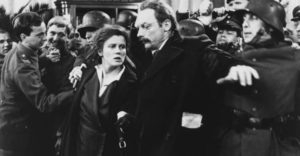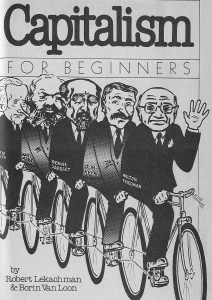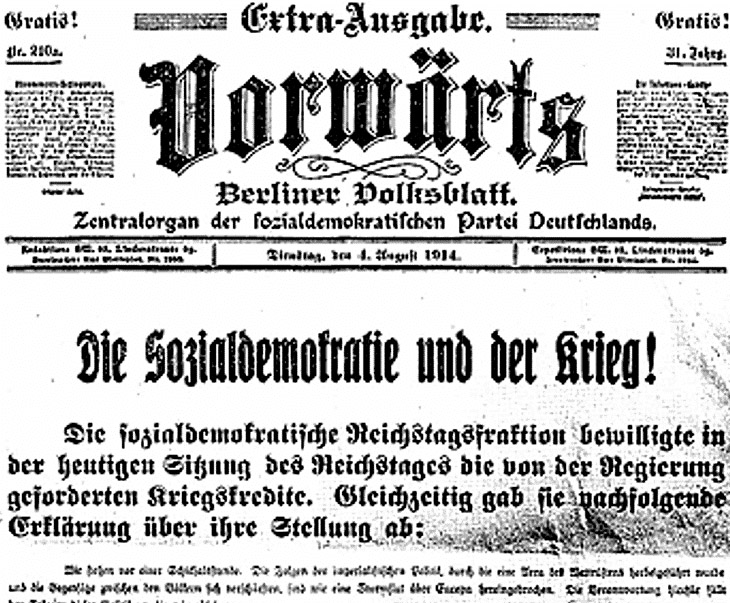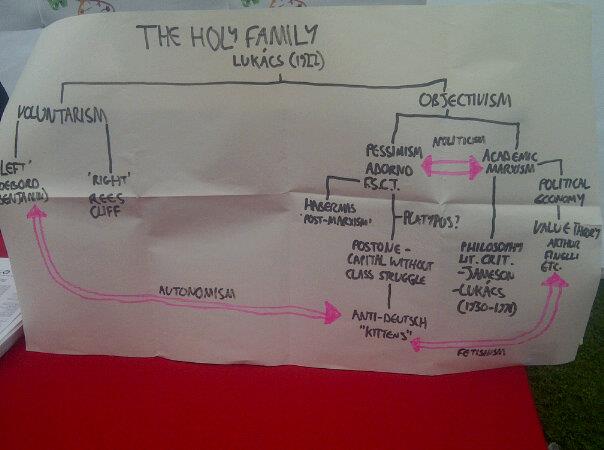Chris Cutrone
Platypus Review 108 | July-August 2018
Prepared opening remarks for an internal discussion by members of Platypus on “Marxism and philosophy” to be held on August 11, 2018.* An audio recording of the event can be found at: <https://archive.org/details/180812PhilosophyAndMarxismAndPlatypus>.
Video recording at: <https://youtu.be/_lq3LOEI7R4>.
Misery
MARXISM CONSIDERED PHILOSOPHY as “bourgeois ideology.” This meant, first and foremost, radical bourgeois philosophy, the modern philosophy of bourgeois emancipation, the thought of the revolt of the Third Estate. But pre-bourgeois philosophy, traditional philosophy, was also addressed as bourgeois ideology, as ideology. But ideology is a modern phenomenon. There’s little point in calling either Aristotle or Augustine “ideology.” It is when philosophy is invoked in bourgeois society that it becomes ideological. (Religion, too!)
So what is meant by philosophy as “ideology”?
This goes to the issue of Marxist “ideology-critique.” What did Marxism mean by ideology as “false consciousness”? “False” in what way? For if bourgeois ideology were considered the ideology of the sociological group of the bourgeoisie — capitalists — then there would be nothing “false” about it: it would be the consciousness adequate to the social being of the ruling class; it would be the true consciousness of the bourgeoisie. So it must be false not for the bourgeoisie but rather for others — for the “proletariat.” This kind of “class analysis” of ideology would be concerned that the workers not fall for the ideology of the ruling class. It would be a warning against the workers adopting the idealism of the bourgeoisie that would blind them to their real social condition in capitalism. The idea here is that somehow the workers would remain ignorant of their exploitation by the capitalists if they remained mired in bourgeois ideology.
Of course Marxism was originally no such “material analysis” — debunking — of wrong thinking. No.
Rather, the original Marxist ideology-critique — Marx and Engels’s ideology-critique of bourgeois society — was the immanent dialectical critique of the way society in capitalism necessarily appears to its members, bourgeois and proletarian — capitalists and workers — alike. It was the critique of the true consciousness of the workers as well as of the capitalists.
Now, that formulation just lost me 99% of ostensible “Marxists” as well as all of the rest of the “Left,” whether socialist or liberal, who do indeed think that the poor benighted workers and other subaltern need us intellectuals to tell them what their true social interests are.
This is not what Marxism — Marx and Engels — originally thought, however.
Marxism began with the critique of socialism, specifically with the critique of the most prominent socialist thinker of Marx and Engels’s formative moment in the 1840s, Pierre-Joseph Proudhon. Proudhon — who coined the term “anarchism” — claimed that he respected only three authorities, intellectually, Adam Smith, Hegel and the Bible!
Marxism is usually thought of as the synthesis of German Idealist philosophy, British political-economy, and French socialist politics. But what Marxism actually was was the immanent dialectical critique of these three phenomena, which Marx and Engels considered three different forms of appearance of the same thing: the most advanced bourgeois ideology of their time, of the early–mid 19th century. They were all true expressions of their historical moment, of the Industrial Revolution. But as such, they were also all false.
Proudhon wrote of the “philosophy of misery,” attacking the heirs of Adam Smith in Utilitarianism — James Mill and Jeremy Bentham — and other contemporary British political economists such as Malthus and David Ricardo and their French counterparts. Marx wrote his first major work on political economy and the class struggle in industrial capitalism as a critique of Proudhon, cleverly inverting its title, The Poverty [Misery] of Philosophy.
I was deeply impressed by this work — and especially by its title — when I first read it as an aspiring young “Marxist” in college. It signified to me a basic truth, which is that the problem of capitalism and its potential overcoming in socialism was not a matter of “philosophy,” not a problem of thinking. Reading further, in Marx’s 1844 Economic and Philosophic Manuscripts, I read and deeply internalized Marx’s injunction that “communism is a dogmatic abstraction” which was “one-sided,” expressing the same thing as its opposite, private property, and, like bourgeois society itself, was internally divided, for instance, between collectivism and individualism, and so could not be considered a vision of an emancipated future society, but only a negation of the present. I had read in Marx and Engels’s Communist Manifesto their critique of “reactionary socialism,” and their observation that everything of which communism stood accused was actually the “specter” of what capitalism itself was already doing — “abolishing private property,” among other things.
This all told me that, for Marx and Engels at least, the problem of bourgeois ideology was not a matter that could be addressed let alone rectified by proper methodology — by a kind of right-thinking opposed to it.
In short, I recognized early on that Marxism was not some better philosophy.
Marxism was not a philosophical critique of philosophy, but rather something else entirely. For instance, Marx and Engels’s critique of the Young Hegelians was not as philosophers, but in their philosophical claims for politics. This was also true of Lenin’s critique of the Machians among the Bolsheviks (in Materialism and Empirio-Criticism, 1908). The critique was of the relation between philosophy and politics. It was thus also not a political critique of philosophy.
Ends
I have titled my talk here, “Ends of philosophy,” after the title for the week in our Platypus primary Marxist reading group syllabus when we read Karl Korsch’s 1923 essay on “Marxism and philosophy,” the recommended background reading for today’s discussion. In the syllabus week title as well as here, I intend to play on the multiple meanings of the word “ends.” What are the ends of philosophy, according to Marxism, in terms of its telos, its goals, its purposes, and its satisfaction; what would it take to attain and thus overcome the aspirations of philosophy?
Specifically, what would it take to satisfy bourgeois — that is to say, modern — philosophy? What would make philosophy superfluous?
This is posed in the same way that Marxism sought to make labor as social value superfluous. How does labor seek to abolish itself in capitalism? The same could be said of philosophy.
What would it take to bring philosophy to an end — to its own end? Not by denying the need for philosophy, but by satisfying it.
But there have been other moments, before (and after) Marxism, which sought to overcome philosophy through its satisfaction, through satisfying the need for philosophy.
The need for — the necessity of — philosophy in the modern world is different from its need previously — fundamentally different. The need to account for freedom in bourgeois emancipation was new and different; this did not motivate and inform traditional philosophy. But it fundamentally tasked modern philosophy — at least the philosophy that mattered most to Marxism, the Enlightenment and German Idealism at its culmination. But the need for philosophy in capitalism is also different from its need in the bourgeois revolution.
Please allow me to address several different historical moments of the end of philosophy. I use this concept of moments of the “end of philosophy” instead of alternative approaches, such as varieties of “anti-philosophy,” because I think that trying to address Marxism as an anti-philosophy is misleading. It is also misleading in addressing other such supposed “anti-philosophies,” such as those of Kierkegaard, Nietzsche, Existentialism, Heidegger, etc., as well as other traditions entirely, such as the Enlightenment philosophes contra “philosophy,” or Empiricism and Analytic Philosophy contra “metaphysics.” (For instance, Heidegger sought the potential end to “thousands of years of Western metaphysics,” going all the way back to Plato.) Yet all these various phenomena express to my mind a common issue, namely the problem of “philosophy” per se in the modern era, both in the era of bourgeois emancipation and subsequently in capitalism.
What is “philosophy,” such that it can experience an end? It is not merely its etymological meaning, the love of knowledge, or wisdom, or the love of thinking. Philosophers are not merely smart or sage — not merely sophists, clever thinkers: philosophy cannot be considered merely the mastery of logic or of semantics. If that were true, then most lawyers would be better philosophers than most avowed “philosophers.”
The end of philosophy cannot be considered an end to sophistry, finally putting the clever fellows down. It cannot be considered an analogue to Shakespeare’s “First, we kill all the lawyers.” It is not meant to be the triumph of Philistinism. Although you might think so from a lot of “Marxist” deprecation of philosophy, especially as “bourgeois ideology.” Such “Marxists” want to put a stop to all mystification by putting a stop to the mystifiers of bourgeois society, the lackeys — the paid liars — of the capitalist bourgeoisie. They want to stop the “philosophers” from pulling the wool down over the eyes of the exploited and oppressed. This is not my meaning. — This was not even Socrates’s (Plato’s) meaning in taking down the Sophists.
Authoritarianism
Philosophy cannot be considered, either negatively or positively, as the arrogation of all thinking: it is not some Queen of the Sciences that is to make proper sense of and superintend any and all human thought in every domain. It is not the King of Reason; not the thought-police. Marxism did not seek to replace philosophy in such a role. No. Yet this seems to be precisely what everyone wants from philosophy — or from anti-philosophy. They want their thinking dictated to them.
Korsch addresses this as “Bonapartism in philosophy:” we seem to want to be told how and what to think by philosophers — or by anti-philosophers. It is an authoritarian impulse. But one that is an authentic expression of our time: capitalism brings forth its own Philosopher Kings.
This is not at all what the immediate predecessors for Marxist thought in philosophy, Kant and Hegel, considered as their task: Kant, in “beginning” philosophy (anew), and Hegel in “completing” this, did not seek to replace the thinking of others. No. Precisely the opposite: they sought to free philosophy, to make it “worldly.” They thought that they could do so precisely because they found that the world had already become “philosophical.”
After them, they thought there would no longer be a need to further develop Philosophy as such, but only the need for philosophical reflection in the various different diverse domains of human activity. Our modern academic institutions reflect this: one receives the PhD, Doctor of Philosophy, in Chemistry, meaning one is qualified to “doctor,” to minister and correct, to treat the methods and attendant thinking — the “philosophy” — of the science of chemistry, without however necessarily becoming an expert specialist “philosopher of science,” or studying the specialized discipline Philosophy of Science per se. According to Lukács, such specialized knowledge as found in academia as well as in the various technical vocations — such as law, journalism, art, etc. — exhibited “reification” in capitalism, a disintegrated particularization of atomized consciousness, in which losing the forest for the trees was the very predicate of experience and knowledge. But this was the opposite of what Kant and Hegel had expected. They expected not disintegration but the organic, living and changing relations of diverse multiplicity.
Marx found a very different world from Kant and Hegel’s, after the Industrial Revolution. It was not a philosophical world in capitalism — not an “enlightened” realm of “sober senses,” to which bourgeois philosophy had aspired, but something much darker. It was a “phantasmagoria” of “commodity fetishism,” full of beguiling “metaphysical subtleties,” for which one needed to refer to the “mist-enveloped regions of religion” for proper models. In capitalism, bourgeois society was sunk in a kind of animism: a world of objects exhibiting “theological niceties.”
There was a need for a new Enlightenment, a Second Enlightenment specific to the needs of the 19th century, that is, specific to the new needs of industrial capitalism, for which the prior thinking of bourgeois emancipation, even at its best, for instance by Rousseau, Adam Smith, Kant and Hegel, was not equipped to adequately address. It needed a new recognition of the relation between social being and consciousness.
But for Marx and Engels, this new task of enlightenment was something that could not be accomplished philosophically — could not be brought to fruition in thinking — but only in actual political struggle and the transformation of society.
History
This was because, unlike the emancipation of bourgeois society, which took several centuries and came to consciousness of itself as such only late, no longer cloaking itself in the religious garb of Christianity — the Protestant Reformation as some return to true Christianity of the original Apostles, freed from the corruptions of the Church — and arrived at self-consciousness only at the end of its process of transformation, in the 18th century. As Hegel put it, “The Owl of Minerva [that is, knowledge] flies at dusk:” proper consciousness comes only “post-festum,” after the fact of change.
But Marx and Engels found the task of socialism in capitalism to be motivated by a new need. The proletarianization of the bourgeois social relations of labor — the society of cooperative production in crisis with the Industrial Revolution — required a new consciousness of contradiction, a “dialectical” and “historical” “materialism,” to properly recognize its tasks. As Marx put it, the social revolution of the 19th century — in contradistinction to the bourgeois revolution — could not take its poetry from the past, but needed to take its poetry from the future. This was quite a paradoxical formulation, especially since Marx and Engels explicitly abjured “utopian socialism,” finding it a realm of images of capitalism, and not of a world beyond it.
This was because they found the workers’ struggles against the capitalists to be motivated by bourgeois consciousness, the consciousness of the bourgeois revolution. Socialism was born in the Jacobinism of the French Revolution, for instance, in the former Jacobin Babeuf’s Conspiracy of Equals, still motivated by the aspirations of “liberty, equality and fraternity.” Proudhon, for example, was motivated in his anarchist socialism, avowedly, by Adam Smith and Hegel (and the Bible) — animated, unabashedly, by bourgeois political economy and philosophy.
Marx and Engels didn’t think that this was wrong, but only inadequate. They didn’t offer an alternative to Proudhon — to Smith and Hegel (or the Bible!) — but only a critique of how bourgeois thought mystified the crisis and task of capitalism. The world necessarily appeared in bourgeois terms — there were no other terms. There was no other form of consciousness. There was no other philosophy. Nor was there a need for a new philosophy.
Bourgeois philosophy, for Marx and Engels, had successfully summed up and appropriated all prior philosophical enlightenment. They agreed with Kant and Hegel. Bourgeois social thought had successfully summed up and completed all prior thinking about society. Marx and Engels neither disputed nor sought to replace it. They were concerned only with its self-contradiction in capitalism. Not its hypocrisy, but its authentic antinomies, which both drove it on and left it stuck. The bourgeois “end of history” turned out to be the opposite of what it intended: not a final stage of freedom, but rather a final stage of unfreedom; the crossroads of “socialism or barbarism.”
Impossibility
This affected the status of philosophy. Bourgeois philosophy no longer described freedom but rather unfreedom. Or, more dialectically, it described both: the reproduction of unfreedom in the struggle for freedom. As a result, the task of freedom was no longer expressed by the need for all human activity to achieve an adequate — Hegelian — philosophically reflective self-consciousness, but rather to realize in practice and thus recognize in consciousness the limits of such self-consciousness, of such philosophical reflection. There was a crisis in radical bourgeois philosophy. The crisis and decay of Hegelianism was an authentic historical phenomenon, not a mistake.
Like liberal democracy, philosophy in capitalism was no longer itself, and was no longer tasked with becoming itself, attaining its aspirations, but rather was tasked with overcoming itself, superseding its achievements. The achievements of bourgeois emancipation seemed ruined in the 19th century.
Indeed, capitalism already accomplished such self-overcoming of bourgeois society, but perversely, negating itself without satisfying itself. In so doing, it constantly re-posed the task of achieving itself, as an impossible necessity. Bourgeois philosophy became the opposite of what it was, utopian. Not worldly philosophy, but an ideal, a mere notion, mocked by the real, ugly and anything-but-philosophical world.
Because of this — precisely because of this — bourgeois philosophy did not end but constantly reinvented itself, however on an increasingly impoverished basis. It radically revolutionized itself, but also, in so doing, radically undermined itself.
Philosophy remained necessary but proved impossible. It disintegrated, into epistemology, ontology and ethics. They went their separate ways. But they also drove themselves into blind alleys — dead-ends. This actually indicates the task of philosophy to overcome itself, however in perverted form.
Metaphysics
So, what is philosophy? One straightforward way of answering this is, simply, metaphysics. Kant, following Rousseau, had overcome the division and opposition between Rationalism and Empiricism by finding a new foundation for metaphysics. This was the Kantian “Copernican Turn” and “revolution” in philosophy. But it was not simply a new metaphysics, but rather a new account of metaphysics — of philosophy — itself. Moreover, it was revolutionary in an additional sense: it was not only a revolution, but also accounted for itself as revolutionary. This is because it was a metaphysics of change, and not merely change but radical qualitative transformation: it was a revolutionary account of the fundamental transformability of the substance of philosophy itself. In short, it was a philosophy of freedom. It was the self-reflection of practical freedom in society — that society made human life’s transcendence of nature possible, at all, but in so doing created new problems to be worked through and overcome.
It is precisely this metaphysics of freedom, however, that has gone into crisis and disintegrated in capitalism. This has been the expression of the crisis and disintegration — the decay — of bourgeois society.
The goal of philosophy in overcoming itself is to free thinking from an overarching and underlying metaphysics at all. Kant and Hegel thought that they had done so already, but capitalism — in its crisis of the metaphysics of bourgeois society — revealed that there was indeed an underlying and overarching metaphysics still to be overcome, that of social practice — society — itself. The self-production and self-overcoming of the subject in its socially and practically objective activity — labor — needed to be overcome.
The end of philosophy — the end of a singular metaphysics, or of metaphysics per se — aims at the freeing of both action and thinking from any unitary framework. It is the freeing of an ever-expanding and limitless — without end — diverse multiplicity of new and different forms of acting, being and knowing.
Postmodernism was, as Moishe Postone put it, “premature post-capitalism.” It aimed at the freeing of the “small-s subjects from the big-S Subject.” It also aimed at freedom from capital-H History. It meant overcoming Hegel’s philosophy of history.
We already live in such freedom in bourgeois society, however perverted by capitalism. Diverse activities already inhabit different realms of being and call forth different kinds of ethical judgments. Doctors and lawyers practice activities that define being — define the “rights of life and liberty and the pursuit of happiness” — in different ways, and are hence ethically bound in different ways. Doctors discipline themselves ethically differently from scientists. Among scientists, Biology has a different epistemology from Physics: there are different methods because there are different objects. There is no “philosophy” in the sense of a metaphysical logic that encompasses them all. Lawyers, for example, practice differential ethics: prosecutors and defense attorneys in criminal law are bound by different rules of behavior; the practice of civil law is ethically distinct from criminal law; the rules of evidence are different. We do not seek to bind society to one form of knowledge, one code of conduct, or one way of life. There is no “philosophy” that could or should encompass them all. It would be arrogant to claim that there is one singular logic that can be mastered by anyone for governing everything.
Bourgeois society has already established well the reasonable limits to philosophy and its competence.
In Ancient civilization there were differentiated realms of being, knowing and acting. There was a caste system, in which there were different laws for peasants; for merchants; for artisans (and for different kinds of artisans, for different arts and different sciences); and for the nobility; and for the clergy. But they were unified in a Divine Order of the Great Chain of Being. There was heterogeneity, but all with a single origin in God: all of God’s creatures in all of God’s Creation. That mystery was to remain unknown to Man — known only to God. There was a reason for everything, but only God could know it. There was not philosophy but theology, and theology was not to arrogate to itself the place of the Mind of God, but only ponder Man’s place in and relationship to it. Theology established the limits to man’s knowledge of God: we knew only what God had revealed to us, through his Covenant. We all heard the Word of God; but God told His different creatures different things. In overcoming theology, philosophy did not seek to replace it. It sought to explore the mind of man, not to relate to and limit itself with respect to the Mind of God. It was not concerned with Divine or Natural limits, but with freedom.
There is no possible one single or once-and-for-all account of freedom, for then freedom would not be free. There is no possible account of “being” free, but only of becoming free. And there is only one such account, that of bourgeois emancipation from traditional civilization. It was to set free all the diverse and multiple activities of mankind, in relation to other humans, to Nature, and to ourselves.
Overcoming
Marx was both a Hegelian and departed from Hegel, with a historical and not a philosophical difference. As Marx put it, for Hegel himself the Hegelian system was not ready-made and finished as it was for those who came after. As Marx observed, Hegelianism went into crisis for real historical reasons, not due to misunderstanding by his followers; but rather the crisis came from Hegelian philosophy’s actual contact with the world, and that world had become as internally contradictory in capitalism as Hegelianism became in contact with it. The Hegelian dialectic is both appropriate and inappropriate to the problem of capitalism. The crisis and disintegration of Hegelianism was a crisis of metaphysics — of philosophy — at a higher and deeper and not a lower or more superficial level from Hegelianism. Hegelianism was falsified not in itself but by history. But Hegelianism was also borne out by history as the last word in philosophy — in metaphysics. Marxism cannot be purged of its Hegelianism without becoming incoherent; Marxism remains Hegelian, albeit with what Lukács called an “additional twist” in the “pure historicization of the dialectic.”
If society in capitalism remains bourgeois in its ideals, with the goal of providing opportunities for social labor, materially, it has become its opposite: as capitalist, it prioritizes not labor but capital, and at the expense of labor. This means society is tasked with the material challenge of overcoming its ideals. But, as Marx recognized, this can only be done on the basis of this society’s own ideals, in and through their self-contradiction. In philosophy, this means the task expressed by the self-contradiction of Hegelianism.
Capitalism is the model of the Marxist-Hegelian procedure of immanent dialectical critique: this is how capitalism itself moves, how it reproduces itself through self-contradiction. Capitalism is its own practical critique, reproducing itself by constantly overcoming itself. As Marx put it, the only limit to capital is capital itself; but capital is the transgression of any and all limits. It is the way capitalism overcomes itself, its dynamic process of change, which is its unfreedom, its self-limitation. The Marxian horizon of freedom beyond capitalism is freedom beyond the Hegelian dialectic, beyond the bourgeois dialectic of transformation — beyond labor as a process of self-overcoming through production.
There thus remains a unitary metaphysics binding all social practices, dominating, constraining and distorting their further development in freedom under capitalism: the bourgeois right of labor. The form of total freedom in bourgeois emancipation — self-production in society — has become in capitalism the form of total unfreedom. The social condition for labor has become that of the self-destruction of labor in capital. The goal of labor in capital is to abolish itself; but it can do so only by realizing itself — as self-contradiction. Hegel’s “negative labor of the concept” must be completed; short of that, it dominates us.
Overcoming this will mean overcoming metaphysics — overcoming philosophy. At least overcoming philosophy in any way known — or knowable — hitherto. | P
Further reading
Cutrone
Chris Cutrone, “Book review: Karl Korsch, Marxism and Philosophy (2008),” Platypus Review 15 (September 2009), available online at: <https://platypus1917.org/2009/09/03/book-review-karl-korsch-marxism-and-philosophy/>.
Cutrone, “Rejoinder on Korsch,” PR 20 (February 2010), available online at: <https://platypus1917.org/2010/02/26/rejoinder-to-david-black-on-karl-korschs-marxism-and-philosophy/>.
Cutrone, “Book review: Gillian Rose, Hegel Contra Sociology (1981, 1995 and 2009): Gillian Rose’s ‘Hegelian’ critique of Marxism,” PR 21 (March 2010), available online at: <https://platypus1917.org/2010/03/15/gillian-roses-hegelian-critique-of-marxism/>.
Cutrone, “Revolution without Marx? Rousseau, Kant and Hegel,” PR 61 (November 2013), available online at: <https://platypus1917.org/2013/11/01/rousseau-kant-hegel/>.
Cutrone, “Why still read Lukács? The place of ‘philosophical’ questions in Marxism,” PR 63 (February 2014), available online at: <https://platypus1917.org/2014/02/01/why-still-read-lukacs-the-place-of-philosophical-questions-in-marxism/>.
Cutrone, “Book review: Andrew Feenberg, The Philosophy of Praxis (2014),” Marxism & Philosophy Review of Books (February 14, 2015), available online at: <https://marxandphilosophy.org.uk/reviews/7988_the-philosophy-of-praxis-review-by-chris-cutrone/>.
Cutrone, “Back to Herbert Spencer! Industrial vs. militant society.” PR 82 (December 2015 – January 2016), available online at: <https://platypus1917.org/2016/01/12/back-to-herbert-spencer/>.
Korsch
Karl Korsch, “Marxism and philosophy” (1923), in Marxism and Philosophy (New York: Monthly Review Press, 1970 and 2008), available online at: <https://www.marxists.org/archive/korsch/1923/marxism-philosophy.htm> [PDF].
Korsch, “The Marxist dialectic” (1923), available online at: <https://www.marxists.org/archive/korsch/1923/marxist-dialectic.htm>.
Korsch, “On materialist dialectic” (1924), available online at: <https://www.marxists.org/archive/korsch/1924/materialist-dialectic.htm>.
Introductory remarks on the topic of “Marxism and philosophy”*
Chris Cutrone
August 11, 2018
An audio recording of the internal discussion by members of Platypus on “Marxism and philosophy” can be found at: <https://archive.org/details/180812PhilosophyAndMarxismAndPlatypus>.
Video recording at: <https://youtu.be/_lq3LOEI7R4>.
Earlier this summer, I visited Athens and made a pilgrimage to Aristotle’s Lyceum. I was struck by the idea that perhaps what I am doing in Platypus is essentially the same as what Socrates, Plato and Aristotle were doing back in Ancient Greece. Spencer and I were recently discussing the recurrent trope of Aristotle and Marx, apropos of today’s discussion of Marxism and philosophy, and he recalled his feeling nauseous when reading Castoriadis’s famous essay on Aristotle and Marx, published in the same issue of the journal Social Research alongside Moishe Postone’s seminal essay, “Necessity, Labor and Time.” Spencer said he had felt sick at the thought that nothing had changed since Aristotle’s time.
I recalled how Frantz Fanon wrote, in Black Skin, White Masks, that he would be happy to learn that an African philosopher had corresponded with Plato, but this wouldn’t make a difference for 8 year-olds in Haiti and the Dominican Republic forced to cut sugar cane for a living. This compares well to the former Black Panther Assata Shakur, who, writing from her exile in Cuba on Black Lives Matter, referred to black Americans as “Africans lost in America.” But are blacks any less lost in Africa today? Am I an Italian or Irish lost in America, too? I often feel that way, that my peasant ancestors were dragged into bourgeois society to ill effect, to my present misery. What would it mean not to be lost? Was I returning home, in a sense, when, as an intellectual, I returned to Aristotle’s school in Athens? Was I any less lost in Athens?
Adorno wrote, in his inaugural lecture on “The idea of natural history,” that “I submit myself, so to speak, to the materialist dialectic.” What he meant of course was that he could only speak misleadingly of submitting himself to the materialist dialectic, as if he would not already be dominated by it, whether he was conscious of his submission or not. This reminds us of Trotsky’s statement to his recalcitrant followers who rejected Hegelianism that, “You may not be interested in the dialectic, but the dialectic is interested in you.”
Why should we be interested in “philosophy,” then? Adorno did not mean that he was submitting himself to Marxism as the “materialist dialectic” in the sense of submitting to Marx’s thought. No. He meant, as we must mean in Platypus, that he accepted the challenge of Marx’s thought as thinking which registered a greater reality, as a challenge and call to task for Adorno’s own thinking.
Foucault wrote about his chagrin that just when one thinks one has overcome Hegel, Hegel is still there smiling back at you. This rather paranoid claim by Foucault as a mental phenomenon has a real meaning, however, which is that Hegel still speaks in some unavoidable way to our real condition. What is meant by “Hegel” here, of course, is the entirety of the alleged “Master Narrative” of the Western philosophical tradition culminating in bourgeois modernity.
Engaging philosophy then, is not being told how to think, but allowing one’s thinking to be challenged and tasked in a specific way. It is a microcosm of how society challenges and tasks our thinking, whether we are inclined to it or not.
Historical philosophers are not some “dead white males” the authority of whose thinking threatens to dominate our own; we do not, or at least ought not, to read philosophy in order to be told how to think. No. The philosophy that comes down to us from history is not the dead weight of the past, but it is part of that past. And the past is not dead or even really past, since past actions still act upon us in the present, whether we like it or not. Marx reminds us that, “Man makes history, but not according to conditions of his own choosing.”
We cannot avoid the past, but we are concerned with the symptomatic attempts to free ourselves from the past by trying to avoid it. Especially on the “Left,” and especially by ostensible “Marxists.”
As Korsch reminds us, among other ways, this can take the form of trying to avoid the “philosophical” aspects of Marxism.
We might recall that Korsch’s essay on “Marxism and philosophy,” the background reading for today, was the very first text we read in the Platypus reading group. This was before it was called Platypus, of course, but it was still our first collective discussion of a reading as a group. Our reading was predicated on opening up, not philosophy, but rather the political foundations for Adorno’s thinking. It was meant to help lead my academic students of Adorno, not from Marxism to philosophy, but rather from philosophy to Marxism.
This is the intention of today’s event as well: we come full circle. Perhaps indeed nothing has changed. | P








